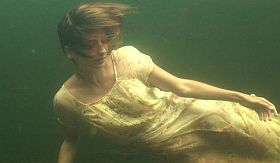Full house for the Q&A of Jorge Pelicano after the screening of his ”Suddenly My Thoughts Halt”, a film from a Portuguese hospital for mentally ill people, very well received by the Belgrade audience, again around 1000 spectators – to judge from the long applause that accompanied the end titles on the screen in the Sava Centre. Pelicano, with his third documentary film, that he directed, filmed and he also took care of the final editing process, invited the 50 people in the VIP room to know more about the difficult process of getting authorization to film, about several patients who did not want to take part or rather their guardians did not give the permission, about the 4-5 weeks of shooting, about him not sleeping there contrary to the actor Miguel, who installs himself to prepare for a theatre play with the patients – have to be said that the hospital uses theatre as a therapeutical tool several times per year.
I was there for three weeks without camera, Pelicano said, and after some time I/we became one(s) of them. We ended up having 250 hours of footage, we edited for 6 months. And we found our main characters – my comment: indeed he did, it will be impossible to forget Alberto, the laughing man with teeth only in the left side of his mouth, and Mr. Andreu, who walks with Alberto, looking like a English gentleman with an umbrella, intellectual, a perfect companion for Alberto, they get along. There is a brilliant scene that Pelicano told us about in his masterclass the next day, with young film students and filmmakers as participants in the
workshop, a scene where the two and Paulo have a conversation on their walk, and then suddenly Alberto bursts into a laughter and does not stop. Andreu signals to the man with the camera ”cut” but Pelicano luckily continues and from the shaky camera movements you can see that he is not able to stop laughing as well. Wonderful! As is the meeting we get with the couple (photo), who hold hands and declare their love to each other. The man is maybe the one, who is the best one to convey what it means to be schizofrenic. He is the one, to whom Miguel, the actor, asks the question – referring to the title of the film (see below) – whether he has tamed ”the wild horse” inside him… I have, is the answer, wow what a scene. Comes at the end of the film.
Pelicano made a superb masterclass. He had prepared a power point but the participants were so engaged that they just started to ask all kind of questions, which gave a great dynamic in the room. Anyway, a quote from the power point of the Portuguese director:
”(I want to)… find a subject with a creative and innovative perspective”. Pelicano comes from journalism, but that it is not at all visible, when you watch the film that works with (another quote) with ”perfectly balanced shots of unbalanced people”. He uses a lot of bird’s eye angles and he dares to introduce the actor and let him go the whole way in introducing/interpreting the poem of Angelo de Lima, a patient from the beginning of the 20th century, whose poem has given the title to the film.
In a tough competition with his director colleagues of the Magnificent 7 11th edition 2015 in Belgrade, Jorge Pelicano delivered the best masterclass, with a focus on practicalities and details to be learnt from… including how to catalogue the visual and the sound material with an annotation, a commentary what was special, a mark in terms whether it could be used or not…analysis of the footage and of course technical information, camera, lenses, image composition, clips etc. On behalf of the organisers, a warm thank you, Mr. Pelicano! We will watch out for your next film!
www.magnificent7festival.org



